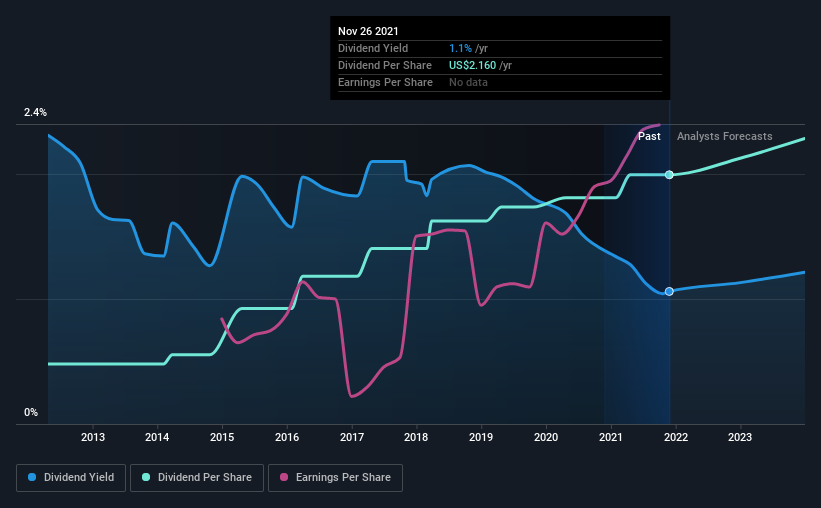Is It Smart To Buy Nasdaq, Inc. (NASDAQ:NDAQ) Before It Goes Ex-Dividend?
Nasdaq, Inc. (NASDAQ:NDAQ) is about to trade ex-dividend in the next four days. Typically, the ex-dividend date is one business day before the record date which is the date on which a company determines the shareholders eligible to receive a dividend. The ex-dividend date is important because any transaction on a stock needs to have been settled before the record date in order to be eligible for a dividend. Therefore, if you purchase Nasdaq's shares on or after the 2nd of December, you won't be eligible to receive the dividend, when it is paid on the 17th of December.
The company's next dividend payment will be US$0.54 per share, on the back of last year when the company paid a total of US$2.16 to shareholders. Last year's total dividend payments show that Nasdaq has a trailing yield of 1.1% on the current share price of $203.68. We love seeing companies pay a dividend, but it's also important to be sure that laying the golden eggs isn't going to kill our golden goose! We need to see whether the dividend is covered by earnings and if it's growing.
Check out our latest analysis for Nasdaq
If a company pays out more in dividends than it earned, then the dividend might become unsustainable - hardly an ideal situation. Nasdaq paid out a comfortable 30% of its profit last year.
Generally speaking, the lower a company's payout ratios, the more resilient its dividend usually is.
Click here to see the company's payout ratio, plus analyst estimates of its future dividends.
Have Earnings And Dividends Been Growing?
Companies with consistently growing earnings per share generally make the best dividend stocks, as they usually find it easier to grow dividends per share. If business enters a downturn and the dividend is cut, the company could see its value fall precipitously. It's encouraging to see Nasdaq has grown its earnings rapidly, up 22% a year for the past five years.
The main way most investors will assess a company's dividend prospects is by checking the historical rate of dividend growth. In the last 10 years, Nasdaq has lifted its dividend by approximately 15% a year on average. Both per-share earnings and dividends have both been growing rapidly in recent times, which is great to see.
Final Takeaway
Has Nasdaq got what it takes to maintain its dividend payments? When companies are growing rapidly and retaining a majority of the profits within the business, it's usually a sign that reinvesting earnings creates more value than paying dividends to shareholders. Perhaps even more importantly - this can sometimes signal management is focused on the long term future of the business. Overall, Nasdaq looks like a promising dividend stock in this analysis, and we think it would be worth investigating further.
While it's tempting to invest in Nasdaq for the dividends alone, you should always be mindful of the risks involved. To that end, you should learn about the 2 warning signs we've spotted with Nasdaq (including 1 which is significant).
A common investment mistake is buying the first interesting stock you see. Here you can find a list of promising dividend stocks with a greater than 2% yield and an upcoming dividend.
This article by Simply Wall St is general in nature. We provide commentary based on historical data and analyst forecasts only using an unbiased methodology and our articles are not intended to be financial advice. It does not constitute a recommendation to buy or sell any stock, and does not take account of your objectives, or your financial situation. We aim to bring you long-term focused analysis driven by fundamental data. Note that our analysis may not factor in the latest price-sensitive company announcements or qualitative material. Simply Wall St has no position in any stocks mentioned.
Have feedback on this article? Concerned about the content? Get in touch with us directly. Alternatively, email editorial-team (at) simplywallst.com.

 Yahoo Finance
Yahoo Finance 
